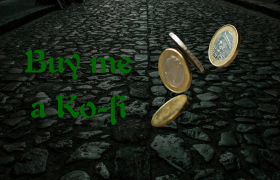Hospitality pt. 2
Sep 04, 2024
When she reentered the living area, Berezi had set out woven mats on the low wooden table in the middle, with plates of food and (thankfully) wooden forks. Ishtal scanned the other woman’s face to see if the choice of cutlery was intended to make some kind of point, but Berezi just smiled and gestured for her to sit down. And the griddled fish and whatever sauce was on those greens did smell an awful lot better than the dry rations in her belt pouch.
Ishtal gave in and sat and started started eating. Everything was as delicious as it smelled, almost enough to distract from the warnings at the back of her mind.
“So while you’re here, you must tell me all about what’s been going on in Bosgarren,” Berezi began. “I’ve been dying of curiosity; Arancha barely ever stops to talk.”
“She’s very…goal-oriented. Responsible,” Ishtal allowed. Something had changed about Berezi between now and their coming into the house, but between the food, trying to not notice anything shiny or interesting, and trying to recall if anything newsworthy had happened at home lately, she couldn’t put her finger on it. “The guardian at Laugarren Herria asked about adopting her last month, again, since she doesn’t have any children of her own to carry on her line, you know. But even if Father hadn’t said no, I think everyone else in the village would have been so horrified that she would’ve stayed anyway.”
“Do tell!” Berezi said, ears pricked forward in interest. And Ishtal did, spinning out the whole story and whatever other interesting bits of gossip she could dredge up, and hoping her fidgeting wasn’t too obvious. Almost without her noticing it, she finished the meal, finally glancing down to see an empty plate.
She pushed to her feet, glad of the excuse to leave. “I’d better get going. They’ll worry if I’m not back before dark.” There was still plenty of time before that for the return trip, at the pace she walked, but there was no reason to say so. “Thank you so much for your hospitality. If I could just get the mail…?”
“Oh, of course.” Berezi sprang up, too. “I almost forgot, with all the talking. You should switch off with Arancha more, come by more often.”
“Maybe I will.” She definitely would not. The next time Arancha was sick on a Seigarren Herria mail day, the trip would just have to wait. Ishtal didn’t think she’d ever in her life been twitchier than she was right now.
The little stack of envelopes and packages was pressed into her hands, and she bundled it into the sack and slung that over her shoulder, and with a minimally polite “Goodbye, all the best to you!”, she was out the door and had made her escape.
By the time she had made her way back along the path to Bosgarren Herria, the quiet and solitude had settled Ishtal’s nerves enough that she didn’t feel about to jump out of her skin anymore. She even started humming to herself as the trees thinned out and she began to see the ring of buildings in the distance. She’d done her job for the day, and faced down Berezi and won (at least as far as she could tell), and all her neighbors would be glad to see her when she returned because she was bringing the mail. Life was good.
Sure enough, as soon as she passed the first houses, children noticed her and started calling out, “Ishtal’s back!”, drawing everyone else’s attention. She didn’t get as much of a crowd as in Seigarren Herria, not being a stranger and a novelty, but a fair number of people gathered around, to see her distribute letters and hear that yes, everything had been quiet on the road, and yes, everyone she’d spoken to in the other village had seemed well, and no, the goats there were still in no way equal to the goats here.
Eventually, everyone dispersed to their business again, and Ishtal headed for her own house, catching sight of Arancha waiting in the doorway.
“Well?” her sister asked once she’d gotten nearer. “How did it go? What happened? Something must’ve kept you, or you’d have been back sooner.”
Ishtal shrugged. “It went all right, I think. Berezi was…oddly friendly. She insisted I stop and have lunch with her. If I didn’t know better, I’d say she’d forgotten all about the incident before.”
Arancha looked far from reassured. “There had to have been something else going on. She barely even knew us before she decided to hold that grudge with you over Kemen. She doesn’t have any reason to be friendly.”
“I know she wasn’t being genuine; give me some credit,” Ishtal retorted. “But I made it out of there without anything going wrong, and I don’t plan on ever going back, so I’m not too worried.”
Father’s voice from inside the house broke into the conversation. “Ishtal, is that you? You’re back just in time for supper.”
“Yes, it’s me, I’m back!” she called. Glancing to Arancha, she added, “I suppose we’d better get inside.”
Father didn’t often cook these days, but with Arancha sick and Ishtal gone all day, he’d made soup, thick and hearty, and was setting bowls of it around the table as they entered. He was getting older, but didn’t look it—perhaps because his fur had already been gray his whole life, or perhaps because he would accept no less than his body retaining its strength and vigor as long as he inhabited it. His back was still straight and his eyes bright and his movements graceful, and he still pushed himself just as hard as he pushed them in training sessions. Arancha, Ishtal had often thought, would be just like him as she got older; they already looked a great deal alike, with their similar sturdy, forest-colored clothing only heightening the resemblance.
Ishtal knew she looked the odd one out among the three of them, with the black fur and yellow eyes that she’d inherited from her barely-remembered mother, but she did the best she could to resemble Father and Arancha in behavior, anyway. She didn’t think either one of them had ever wondered, or had cause to wonder, if they were supposed to do what they were doing at any given moment.
They sat down to eat, and after a moment or so, Father inquired, “So how was Seigarren Herria? Anything interesting happen?”
Arancha didn’t speak aloud, but she shot Ishtal a look that clearly said, You need to tell him about that unnaturalness with Berezi.
Ishtal flicked a glare back at her that hopefully communicated, It’s fine, nothing happened, so I don’t need to bring it up.
“Not really,” she said, stirring at her soup. “The whole trip was pretty uneventful, actually.”
At that precise moment, a fur-raising screech from outside rent the air, with a near-hysterical voice shrieking out, “THIEEEEF!”
Ishtal’s hackles were up before she consciously recognized the voice as Berezi’s. Barely daring to look at Father’s reaction, she automatically blurted out, “It wasn’t me, I swear! I didn’t do anything!”
A reassuring response would have been “Of course you didn’t,” or “Why would we assume you had done something?” Father’s response was to shoot her an unreadable glance, stand up from the table, and slowly make his way out to where the commotion was happening.
Arancha was quick to follow suit, pulling Ishtal after her. “You really should have told him,” she muttered as they went. “Now you’ve lost your chance to present your side first.”
“Would I have even had time?” Ishtal pointed out.
There was no chance to argue about it any further. Berezi was standing in the middle of the village, breathing hard, with a very beleaguered-looking Kemen at her side, and they were drawing a crowd. They attracted even more attention a second later when Berezi spotted Ishtal emerging from the house and pointed dramatically at her, crying “There she is! Thief! She robbed me blind only hours ago! I realized it as soon as she left, but I could only give chase now, once my husband returned and could escort me.”
“I didn’t do any such thing!” Ishtal protested, trying not to quail under the stares of Father, the village head Oroitz, and what felt like every single one of her neighbors. “You invited me in for lunch, but I didn’t take anything. There wasn’t even anything lying around that I could have taken!”
“A liar as well!” Berezi declared. “I did extend her hospitality, that much is true, and I set aside the jewelry I was wearing to serve up some food. But when I went back to where I’d left it, every bit was gone. The seme bakarra must have taken it while my back was turned!”
Ishtal spread out her hands defensively. “I didn’t, I swear! I never went near it.” Now that she thought about it, that was what had been different about Berezi after Ishtal had come back from washing up; all the jewelry had been gone. Ishtal had been trying so hard to think of anything else that she hadn’t let herself register it.
Father sighed. “This should be easy enough to prove or disprove,” he said wearily. “Ishtal hasn’t been out of my sight since she came into the house, so if she did take anything—and I’m sure if she has, it was an accident—it would still be in her pockets. Daughter, if you would be so kind?”
With a huff, Ishtal jammed her left hand into her pants pocket—
—and froze, horror shooting through her, as her fingers brushed metal.
Something on her face must have given her away, because Berezi let out a shout of triumph before Ishtal had even pulled the bracelet out of her pocket. Numbly, she reached into her pocket on the other side, encountering a pair of rings. Investigations into the pouches of her belt produced several more rings, and a pendant necklace she hadn’t even seen Berezi wearing before.
Now it was leaching back into her memory: she’d been sitting there, tense as a bowstring and her mind going about three different directions at once, and one of her hands had fidgeted its way under the cushion she was sitting on, and closed on a ring. She hadn’t even realized she was stowing it away, or that her hands kept slipping under the cushion or under the mat her plate was resting on, encountering piece after piece of Berezi’s valuables and simply taking.
It had been a trap, she realized with a sinking feeling. Berezi had never actually put the jewelry away; she’d hidden it specifically to make Ishtal do something incriminating. It couldn’t have been a very long-considered plan, since she had no way of knowing Ishtal would come by that day or any other, but it hadn’t needed to be. Ishtal had been caught red-handed—and, she realized with a sinking feeling, because she’d already lied to Father about how her trip had gone, she had a much lower chance of having her side believed now.
It wasn’t fair, she thought inanely. The day had been going so well up until now. Everything had been so normal.
“I didn’t know!” she protested. With a few quick strides, she crossed the remaining distance to Berezi. “Here, take it, you can have it, I didn’t know I was taking it or even that it was there!”
Berezi snatched at the jewelry, then stepped sharply back. “Do you think I care about your excuses?” she snapped. “Perhaps your neighbors might have overlooked your proclivity when it was limited to random baubles, but these are all my most valuable things. This time, you’ve gone too far.” She half-turned, facing Oroitz and Father and a large chunk of the gathered crowd. “I say someone who would do this is unfit to be a guardian of our people. More than that, I say she is unfit to live among us! Her thieving marks her as more like the ilegabeak than us, and she deserves no more and no less than to be sent to live as one of them!”
Dread swooped sickly through Ishtal’s gut. “What? No! I haven’t—you can’t—” Exile was for murderers and the perpetrators of similarly terrible crimes, or at least, that was what she’d always assumed. Now that she frantically thought it through, she couldn’t remember ever hearing the details of someone being banished. It hadn’t happened to anyone in her own village during her lifetime so far. The few times Father spoke of it, he’d said that the conditions of the law were mostly undefined, and up to the village head’s discretion.
She looked pleadingly at Oroitz. “You’ve known me my whole life; you know this wasn’t on purpose!”
“Do you think I’m just going to let this drop?” Berezi’s voice rang out clearly over the murmuring of the crowd. “This is the second time I’ve been wronged. If there is no justice today, I will keep pressing the issue with anyone I need to until she and anyone protecting her are disgraced!”
The murmuring increased in volume until it seemed like a hazy roar. She’s going to get her way, Ishtal realized distantly. I’m going to be sent away from my home.
Father seemed to realize this, too, as he moved closer to Oroitz, radiating tension. “You can’t do this. Oroitz, you know Ishtal wouldn’t do something like this maliciously. You know what Berezi is; I told you before. Set some kind of punishment if you must, but surely there’s no need to resort to exile.”
Oroitz looked at Father, then at Ishtal, then at Berezi, and back to Father again. “Arkaitz,” he said quietly, “I do know what Berezi is, and I know Ishtal. Perhaps this is better. Ishtal will get a fresh start this way, a new life with new chances.”
I don’t want it! Ishtal wanted to scream. But she saw Father hesitate, and then bow his head in acceptance, and knew that was the end of it.
“Father, no—!” That was Arancha, crying out in horror, but Father laid his hand on her shoulder, and spoke in her ear, and she quieted.
“Exile!” Berezi cried out triumphantly, gripping Kemen’s arm and seemingly oblivious to his flattened ears and discomfort. More and more of the crowd started taking up the chant.
I’ve known you people since I was born, Ishtal thought numbly.
“Exile,” Oroitz decreed levelly, and everyone else went silent.
“Ishtal ume-Arkaitz,” he continued, “for your crimes against our community, which must be strong in itself if we are to survive in this world, I hereby banish you from among us. No village of our people may be a shelter for you, and no hand of the Onena may aid you, nor tongue of the Onena speak to you, unless it be that of another who has gone forth from us. Your family name is stripped from you, and you shall be known henceforth as ‘Inon’, one of those who has no place.
“You shall leave tonight with nothing more than what you now carry, and you must be gone from the forest that shelters us before the next sunset. Word of this decision shall be carried to all other villages, so all will know to turn you away should you make an attempt on them.” He paused. “So it is decreed.”
Perhaps Ishtal could have tried to argue, or at least taken a moment to say goodbye with dignity. But in that moment, as they stood there silently hearing this, she wanted none of it. She couldn’t stand to see the petty triumph undoubtedly on Berezi’s face, or whatever might be in the eyes of her former neighbors.
She could only flee. And so she did, turning and running out of the village and through the trees until she could run no further and collapsed, weeping, beneath a tree.
Shadow of the Dragons
1.4k views64 subscribers
Ishtal is sure her life is as good as over when her village banishes her.
All her life, she's believed that her people, the catlike Onena, would never be welcome outside of the small territory where they've isolated themselves. But when the involuntary kleptomania that's haunted her for years finally goes too far, she's given no choice but to leave and make her way in the world.
The good news? There is a place for her, with the Green Dragon Gang and their motley members who take her in with open arms. The bad news? A run-in with a rival gang ends up making Ishtal a target, and could put her new friends at risk. She's going to have to dodge assassins and the city watch, navigate the chaos of a city that's never truly peaceful, and (maybe) manage to control her wandering fingers if she's going to land on her feet.
Read on for found family, slow-burn interspecies romance, and criminal hijinks!
All her life, she's believed that her people, the catlike Onena, would never be welcome outside of the small territory where they've isolated themselves. But when the involuntary kleptomania that's haunted her for years finally goes too far, she's given no choice but to leave and make her way in the world.
The good news? There is a place for her, with the Green Dragon Gang and their motley members who take her in with open arms. The bad news? A run-in with a rival gang ends up making Ishtal a target, and could put her new friends at risk. She's going to have to dodge assassins and the city watch, navigate the chaos of a city that's never truly peaceful, and (maybe) manage to control her wandering fingers if she's going to land on her feet.
Read on for found family, slow-burn interspecies romance, and criminal hijinks!












Comments (0)
See all